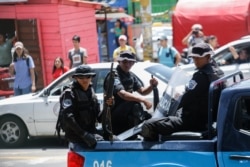A U.N. report finds human rights violations and repression of fundamental freedoms in Nicaragua continue a year after a violent crackdown on dissent killed more than 300 protesters and injured more than 2,000.
Submitting the report before the U.N. Human Rights Council in Geneva, U.N. Rights Chief Michelle Bachelet said the number of violations against life and personal integrity has decreased since the end of February when the government and the Civic Alliance for Justice and Democracy resumed their dialogue.
But at the same time she noted that the human rights crisis in Nicaragua remains acute. She said homicides by security forces continue. Acts of torture and mistreatment of detained protesters continue. The civic space in Nicaragua has been significantly reduced.
“Free speech has been restricted through actions that range from the closing of press sources and the seizure of their equipment and property to the imprisonment of national journalists for months. There have been arbitrary arrests as well for the simple act of flying a Nicaraguan flag or singing the national anthem in public space,” she said.
Bachelet said people are unable to exercise their right to peaceful assembly and freedom of association. She said human rights defenders, indigenous and Afro-descendant leaders critical of the government are harassed, stigmatized and threatened by the police.
Also speaking in Geneva, representative of the Inter American Human Rights Commission, Antonia Urrejola said a climate of fear pervades the country. She said state repression extends to the persecution of religious celebrations and threats against certain leaders of the Catholic church.
“Trials against opposition members without guarantees of due process and imposition of a police state. Any dissenting voice or opposition to the current government is harassed, persecuted or attacked by state agents…Impunity for grave acts continues,” Urrejola said.
Advisor to the President of Nicaragua, Minister Valdrack Ludwing Whitaker refuted the High Commissioner’s findings, saying they lack veracity and credibility.
“Throughout the report, there is deliberate omission of the acts of terrorism, assassination, torture, abductions, violations, theft with intimidation, arson, extortion, other offenses of organized crime with the utilization of arms of all kinds, including firearms perpetrated by supposed peaceful protesters,” he said.
More than 83,000 dissidents have been forced into exile since the start of the crisis. Activists are urging the international community to maintain vigilance over Nicaragua and to pressure the country’s government to rule in accordance with international human rights standards.








